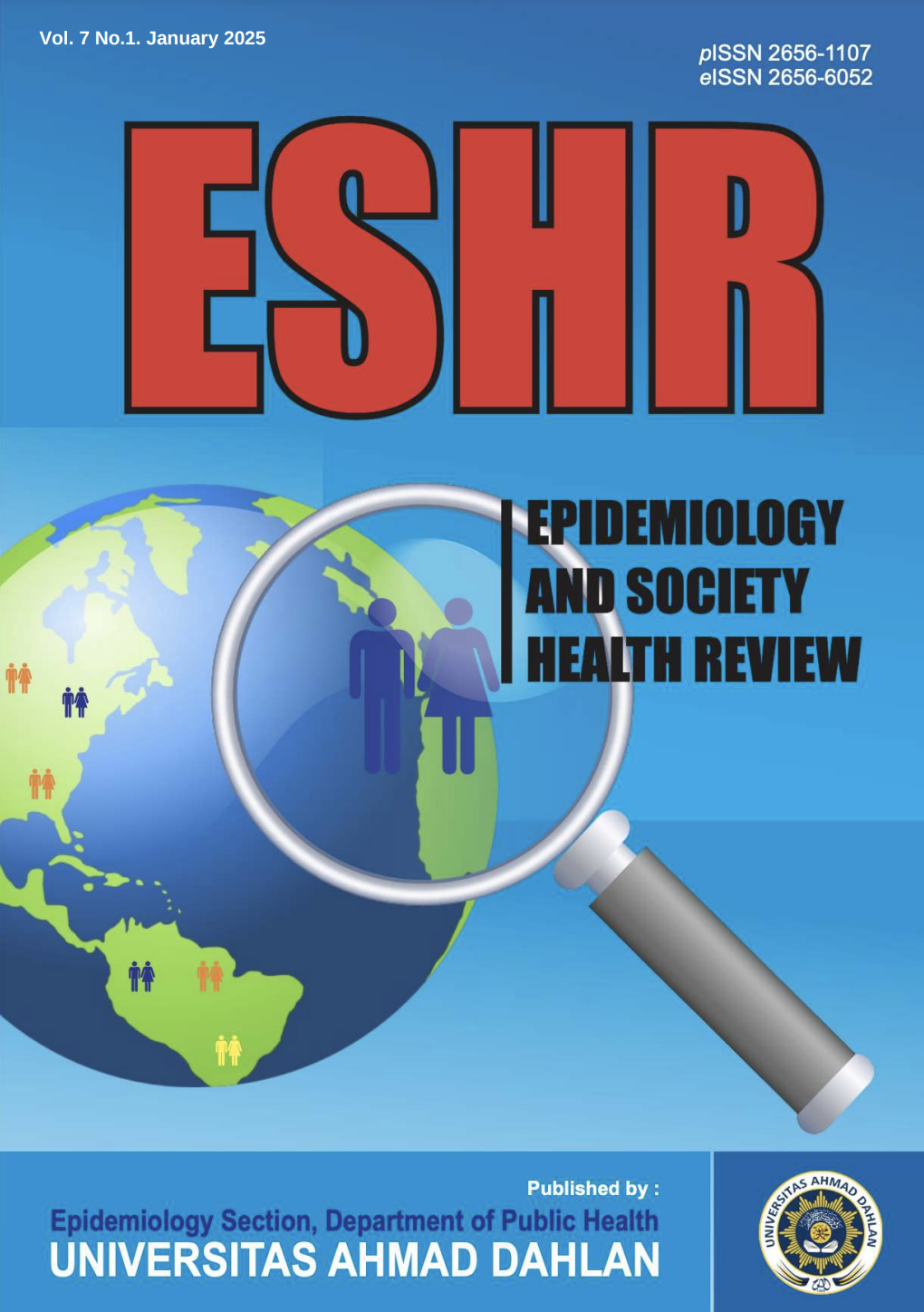Overview of Nutritional Status, Breakfast Habits, and Nutritional Knowledge among University Students
DOI:
https://doi.org/10.26555/eshr.v7i1.12716Keywords:
Nutritional Status, Breakfast Habits, Nutrition Knowledge, StudentsAbstract
Background: Nutrition-related issues can lead to increased morbidity and mortality, with a rising prevalence of malnutrition among young adults. Breakfast habits and nutrition-related knowledge significantly influence an individual's nutritional status. This research aims to describe breakfast habits, nutritional knowledge, and nutritional status among students of the Faculty of Health Sciences at UIN Syarif Hidayatullah Jakarta from 2020 to 2022.
Method: This was a quantitative study that employed a cross-sectional. The study includes 469 students from the Faculty of Health Sciences at UIN Syarif Hidayatullah Jakarta, selected through stratified random sampling based on the year of admission. Data were analyzed using univariate methods to observe the frequency distribution of nutritional status, breakfast habits, and nutrition knowledge among the students.
Results: The findings indicate that a significant proportion of students have underweight nutritional status (30.3%), engage in irregular breakfast habits (56.7%), and consume breakfast after 9:00 AM (44.8%). Additionally, many students do not include staple foods in their breakfast (45.2%) and lack sufficient nutrition knowledge (43.9%).
Conclusion: The study reveals ongoing nutritional challenges among students, including underweight status and obesity. Corresponding with these issues, some students exhibit irregular breakfast habits and delay breakfast until after 9:00 AM. Furthermore, 45.2% of students omit staple foods from their breakfast, and 43.9% possess inadequate nutrition knowledge. Future research should explore the relationship between breakfast habits, nutrition knowledge, and individual nutritional status to provide more comprehensive insights.
References
Adha CN, Prastia TN, Rachmania W. Gambaran Status Gizi Berdasarkan Lingkar Lengan Atas Dan Indeks Massa Tubuh Pada Mahasiswi Fikes Uika Bogor Tahun 2019. Promotor. 2019;2(5):340–50. https://doi.org/10.32832/pro.v2i5.2523
Whitney, E., & Rolfes SR. Understanding nutrition, thirteenth edition (13th ed.). Singapore: Wadsworth and Cengage Learning; 2013.
World Health Organization (WHO). Nutrition. 2022 [cited 2023 Nov 20].
Kemenkes RI. Laporan Riset Kesehatan Dasar. 2018.
Agustian H, Kumala M. Hubungan sarapan dengan status gizi pada mahasiswa Fakultas Kedokteran Universitas Tarumanagara angkatan 2013. Tarumanagara Medical Journal. 2018;1(1):80–8.
Putra A, Syafira DN, Maulyda S, Cahyati WH. Kebiasaan Sarapan pada Mahasiswa Aktif. HIGEIA (Journal of Public Health Research and Development). 2018;2(4):577–86. https://doi.org/10.15294/higeia.v2i4.26803
Jayanti, Y. D., & Novananda NE. Hubungan pengetahuan tentang gizi seimbang dengan status gizi pada remaja putri kelas XI akuntansi 2 (di SMK PGRI 2 Kota Kediri). Jurnal Kebidanan. 2017;6(2):100–8.
Soraya D, Sukandar D, Sinaga T. Hubungan pengetahuan gizi, tingkat kecukupan zat gizi, dan aktivitas fisik dengan status gizi pada guru SMP. Jurnal Gizi Indonesia (The Indonesian Journal of Nutrition). 2017;6(1):29–36. https://doi.org/10.14710/jgi.6.1.29-36
Kanah P. Hubungan Pengetahuan Dan Pola Konsumsi Dengan Status Gizi Pada Mahasiswa Kesehatan. Medical Technology and Public Health Journal. 2020;4(2):203–11. https://doi.org/10.33086/mtphj.v4i2.1199
Puspitasari DI, Rahmani A. Description of Breakfast Behaviour And Nutritional Status Of Nutrition And Non-Nutrtiton Students At Universitas Muhammadiyah Surakarta. MPPKI (Media Publikasi Promosi Kesehatan Indonesia): The Indonesian Journal of Health Promotion. 2018;1(2):46–51. https://doi.org/10.56338/mppki.v1i2.161
Kemenkes RI. Pedoman Gizi Seimbang. 2014.
Hisbullah Amrinanto A, Widya Dwinugraha K. Gambaran Kebiasaan Sarapan Dan Status Gizi Pada Mahasiswa Kesehatan. 2022;2(1):15–9.
Wiratmini IGAM. Gambaran Status Gizi Berdasarkan Tingkat Pengetahuan Sarapan Dan Konsumsi Sarapan Siswa SMP Negeri 2 Sidemen Kabupaten Karangasem. 2019;9(2):91–8.
Anzarkusuma IS, Mulyani EY, Jus’at I, Angkasa D. Nutritional Status Based on Primary School Student’s Dietary Intake in Rajeg District Tangerang City. Indonesian Journal of Human Nutrition. 2014;1(2):135–48.
Soedibyo S, Gunawan H. Kebiasaan Sarapan di Kalangan Anak Usia Sekolah Dasar di Poliklinik Umum Departemen Ilmu Kesehatan Anak FKUI-RSCM. Sari Pediatri. 2016;11(1):66. http://dx.doi.org/10.14238/sp11.1.2009.66-70
Moesijanti S, Sutardjo S, Almatsier S. Gizi Seimbang Dalam Daur Kehidupan. Jakarta: Gramedia Pustaka; 2011
Niswah I, Damanik MRM, Ekawidyani KR. Breakfast Habits, Nutritional Status, and Health Related Quality of Life of Adolescents in Bosowa Bina Insani Junior High School Bogor. Jurnal Gizi dan Pangan. 2014;9(10):97–102. https://doi.org/10.25182/jgp.2014.9.2.%25p
Karimah I. Kebiasaan Sarapan Dan Prestasi Belajar Siswa Sd Di Kota Bogor Tahun 2013. Media Informasi. 2018;14(2):175–81. https://doi.org/10.37160/bmi.v14i2.209
Selaindoong SJ, Amisi MD, Kalesaran AFC. Gambaran Pengetahuan Gizi Mahasiswa Semester Iv Fakultas Kesehatan Masyarakat Universitas Sam Ratulangi Saat Pembatasan Sosial Masa Pandemi Covid-19. Jurnal KESMAS. 2020;9(6):8–16.
Pritasari, P., Didit, D., & Nugraheni TL. Gizi Dalam Daur Kehidupan. Jakarta: Kementerian Kesehatan Republik Indonesia; 2017.
Downloads
Published
Issue
Section
License
Copyright (c) 2025 Afaf Syaima, Dewi Yully Wulandari, Intan Gandini, Hoirun Nisa

This work is licensed under a Creative Commons Attribution-ShareAlike 4.0 International License.
Authors who publish with ESHR agree to the following terms:
- Authors retain copyright and grant the journal right of first publication with the work simultaneously licensed under a Creative Commons Attribution License (CC BY-SA 4.0) that allows others to share the work with an acknowledgment of the work's authorship and initial publication in this journal.
- Authors are able to enter into separate, additional contractual arrangements for the non-exclusive distribution of the journal's published version of the work (e.g., post it to an institutional repository or publish it in a book), with an acknowledgment of its initial publication in this journal.
- Authors are permitted and encouraged to post their work online (e.g., in institutional repositories or on their website) prior to and during the submission process, as it can lead to productive exchanges, as well as earlier and greater citation of published work.












